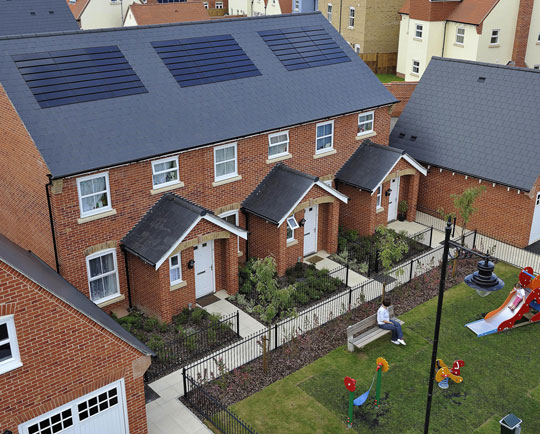Investing
Is now the time to invest in solar panels?

Talking about using solar energy in the UK might seem slightly ironic given our climate, but it remains an easy way to lower your household bills.
The price of running your house seems to be increasing every few months. Utility bills continue to go through the roof and many families are now struggling to keep their day-to-day living costs down.
Energy suppliers hiked up prices last summer, with some households being faced with an increase of 19% on their energy bills. That’s not small change. Therefore it is easy to see why for some solar panels may be a good investment for more than just environmental reasons.
According to the Solar Trade Association (STA), British homes owners and investors are increasingly honing in on the sunny side of investing in solar panels to generate returns from their rooftops.
But the industry has recently been hit by a lull in interest after the government reduced the rates on the feed-in tariff (FIT) for solar photo voltaic (PV) installations. These had previously rewarded people for solar panel home installation and the loss has effectively frozen growth across the renewable energy sector.
Marcus Vassiliou, sales manager of alternative investment company EcoInvestments, said: “Investors may have been put off investing in UK solar, aware that feed-in tariffs have already been reduced, perhaps worried that they had missed the boat.
“Now, however, technology has progressed, enabling the price of reliable PV panels to come down to a level where investors can still obtain serious returns.”
Under the government’s feed-in tariff (FIT) scheme payments are guaranteed for 25 years, with the price per kilowatt of energy index-linked and anything you make from FIT scheme untaxed.
But the current rates payable from the FIT have been significantly lowered, and there may be further cuts coming, this is something that is worth considering.
The government attempted to cut subsidies in December last year but it was challenged and their actions found unlawful. Households that are already receiving FIT payments need not worry as payments from those will not be lowered.
There are several other things that interested investors need to be aware of.
• If this is to be looked at purely as an investment tool – then you need to be aware of what to expect.
If you were to put £10,000 into a savings account at rate of 3% interest, then you will gain around £11,000 in interest over the 25 years.
Put the same amount towards your solar panel investment than you are looking at 25 years in an investment that you cannot take the original deposit from. Under the new FIT scheme, your money will grow at around 1.6%, so you can expect just under £15,000 return on your money.
But you have to take the initial £10,000 away from the final return, so your actual yield will actually be around £5,000.
• Sales pitches are not necessarily calculated correctly.
Before the proposed cuts to the FIT scheme, consumer watchdog Which? had investigated the way solar panels were being sold to consumers and found that some companies provided projected growth rates of 8% to 10%.
Which? also found that these providers were not highlighting the effects of the index-linked FIT, maintenance costs and panel deterioration. All of which might affect the final calculation of your return.
• Maximising your returns
Another good way of making sure that you maximise your earnings is to re-invest any gains that you make. You can put the amount straight into a high yield savings account, or a cash ISA to ensure that your tax free gains are protected.
The FIT, being index-linked, could also mean that a rise in inflation could result in higher savings overall.
• Paying for your solar panels
The most cost-effective way to pay for the installation of solar PV panels and a solar battery storage equipment is upfront and in full. However, if you are not a cash buyer then it is very much worth remembering that if you do choose to re-mortgage your home in order to pay for the panels, the interest accrued on your loan may exceed any profit your make from the investment.
There are companies and schemes that will install the solar panels for free, but buyers should be fully aware of what they are signing up to. This is a 25 year commitment on what is usually your most valuable asset, so the reputation and customer friendliness of your company is paramount.
You do not want to be stuck with a company that does not fix any problems as soon as they arise. The general health of the company is equally important, they need to stick around for the full 25 years too.
Others things that you need to consider:
• Check with your local authority in case you need planning permission, generally you won’t, but it’s best to check before making any other decisions.
• Get in touch with your home insurance provider, and make sure that they are in the loop with any changes that you are taking on the property.
• If you choose to make changes to your attic later on, you might not be able to, as a result you need to ask your solar panel provider for the exact details on the installation – size, space etc.